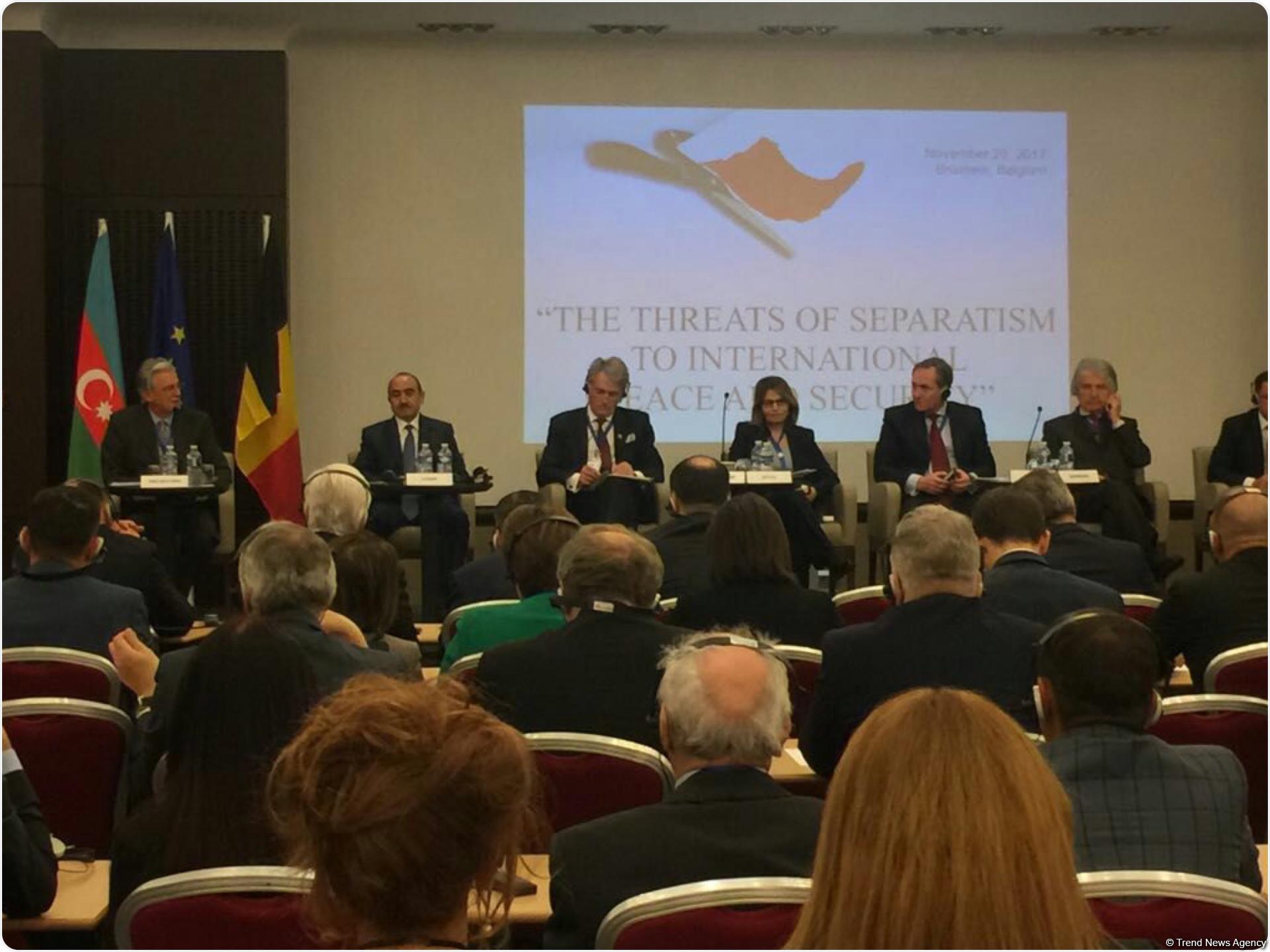Baku, Azerbaijan, Nov. 20
Trend:
An international forum on “The Threats of Separatism to International Peace and Security” was held in Belgium’s Brussels on Nov. 20 with the organizational support of the Azerbaijani State Committee for Work with the Diaspora and the Congress of European Azerbaijanis.
The event was attended by Azerbaijani President’s Assistant for Public and Political Affairs Ali Hasanov, representatives of the Azerbaijani embassy in Belgium, Chairman of the State Committee on Work with Diaspora Nazim Ibrahimov, heads of Azerbaijan’s diaspora organizations in Europe, as well as many international experts, political figures, former presidents, prime ministers and chairpersons of parliament.
Addressing the event, Hasanov said that the forum is dedicated to a very topical issue that concerns the modern world.
It is very important to hold discussions to find a way to solve the crisis caused by dangerous trends such as international terrorism and ethnic separatism, he noted.
“We all are concerned with the difficulties in addressing refugee and migrant problems, human trafficking and smuggling, and threats to political and economic stability, transportation and energy security,” said Hasanov.
“Observations show that ethnic separatism and its negative manifestations have a special place among these threats.”
The top official noted that the strengthening of tendencies of ethnic separatism in the modern world is one of the important factors that negatively affect the ensuring of regional and international security, mankind’s living in peace and tranquility.
“After the end of the Cold War, a new wave of ethnic separatism tendencies emerged in the former Soviet Union. Nagorno-Karabakh conflict in Azerbaijan, Abkhazia and Ossetia conflict in Georgia and Transnistrian conflict in Moldova have become a source of potential threats to the region’s stability. These conflicts lead to gross violations of international legal principles, and emerging of serious threats to the territorial integrity and sovereignty of states,” he said.
Hasanov emphasized that the resolute fight against ethnic separatism by such authoritative international organizations as the UN, OSCE and the Council of Europe is one of important issues today. Otherwise, ethnic separatism, as a negative trend, can turn a large part of the world into an arena of interethnic conflicts, he added.
Unfortunately, currently, the “double standards” policy in the system of international relations hinders the resolution and principled fight against ethnic separatism, said Hasanov.
In some cases, leading international organizations are indifferent to the issue of whether all the states of the world follow the legal norms, which include the elimination of ethnic separatism, the effective methods of fighting and a mechanism for punishing criminals, he added.
This casts shadow on the objectivity of organizations such as the UN, OSCE and the Council of Europe, Hasanov noted, adding that therefore, those leading international organizations should abandon the double standards and increase their efforts to resolve ethnic conflicts within international legal norms.
He added that religious, racial and national intolerance and destructive separatism force people to experience massive refugee and migrant life.
“It should be noted that Azerbaijan, which has been subjected to the policy of ethnic cleansing and occupation of Armenia, understands very well the difficulties existing in this sphere. In 1918, when Azerbaijan Democratic Republic proclaimed its independence, it faced Armenian separatism. During the former Soviet Union, the separatist actions of Armenians against Azerbaijan switched from an active phase to a phase of simmering conflict. However, after the collapse of the USSR, Armenia began to pursue an ethnic separatism and aggression policy against Azerbaijan, by making groundless territorial claims,” said Hasanov.
“Armenian armed forces committed genocide against the Azerbaijani population of Khojaly city in February 1992. As a result of the Nagorno-Karabakh conflict, formed on the basis of ethnic separatism and territorial claims of Armenians, 20 percent of Azerbaijan’s territory is under occupation. The activity of the so-called Nagorno-Karabakh regime created by the Armenian separatists in the Azerbaijani territory with Armenia’s support means the gross violation of international law. Unfortunately, the organizations that claim to fulfill their missions to ensure the international legal principles, including the United Nations, as well as leading countries of the world continue to act as mere observers with regard to this issue,” added the top official.
According to Azerbaijan, it is inadmissible to establish a state within the territory of a state, defined by international law, and to use national, ethnic fragmentation to achieve this goal, said Hasanov.
Azerbaijan urges the world community to take practical steps and to avoid Armenia’s aggression policy, by warning of the threats that the Nagorno-Karabakh conflict may pose in the region, he added.
The Azerbaijani top official noted with regret that unresolved issues, such as the Nagorno-Karabakh conflict, hinder the development of Azerbaijan’s high-level partnership with the European Union.
Regional and global violations of the territorial integrity of countries, ways of resolving the conflicts and separatist tendencies caused by separatism were also discussed at the event.






